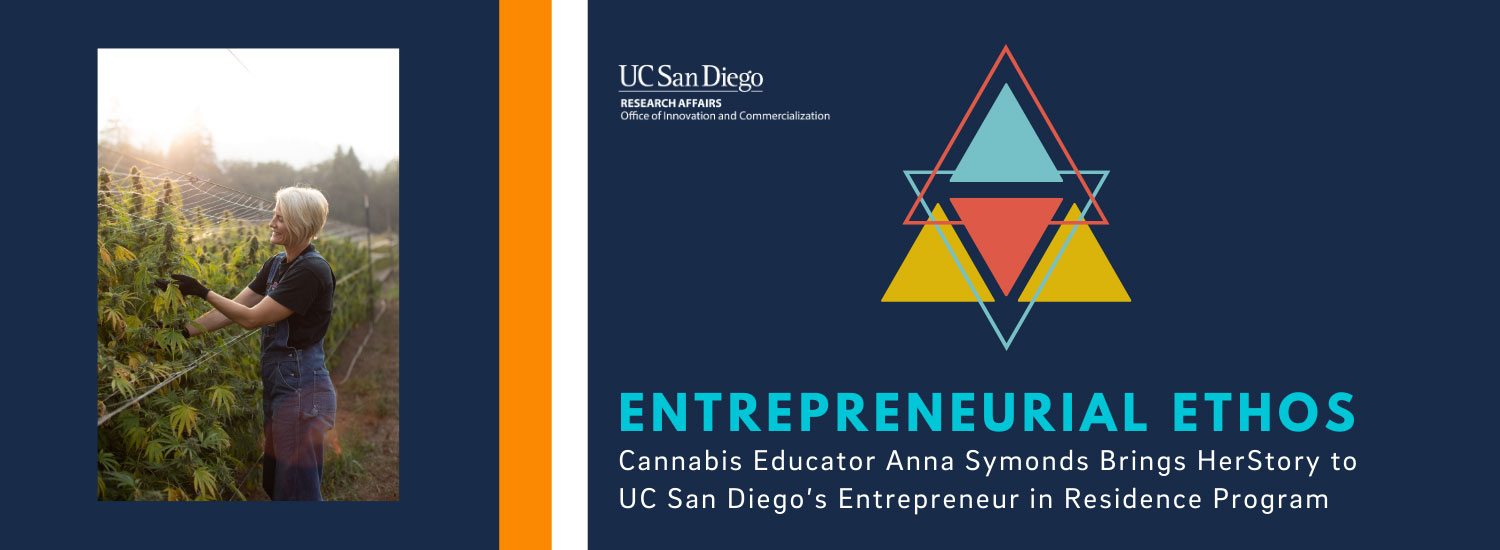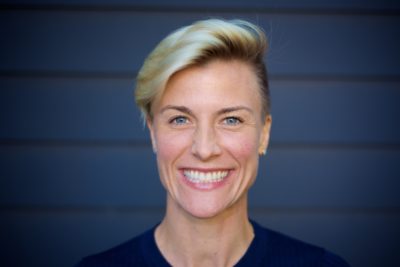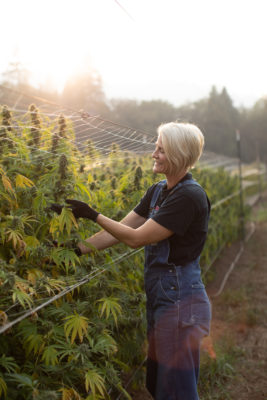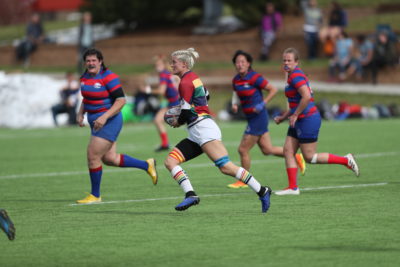
Cannabis Educator Anna Symonds Brings HerStory to UC San Diego’s Entrepreneur in Residence Program
March 2, 2021
Educator and advocate, East Fork Cultivars' Director of Education, Anna Symonds has taught thousands of people about cannabis science, including educating and lobbying lawmakers at the local, state, and national levels.
Developing a CBD-focused cannabis science educational program to share research and practical knowledge about cannabis and hemp with dispensary staff, Symonds has directly educated thousands of people on cannabis and CBD science, educating lawmakers at the local, state, and national levels for cannabis legalization, patient access, and removing the barriers to clinical research.
In celebration of UC San Diego’s HerStory Month, we had the pleasure of connecting with Anna Symonds, a team player who thrives in the collaborative environment of cannabis education.
Working at the forefront of CBD/cannabinoid engagement, what excites you most - the science or the social impact side? What motivates you to advocate for cannabis science education?
 I enjoy learning the science but it's really bettering people's lives that excites me the most. I’ve heard so many stories from people about how cannabis therapeutics have meaningfully changed their lives for the better. That’s incredibly rewarding. I’ve worked with these people on their journey.
I enjoy learning the science but it's really bettering people's lives that excites me the most. I’ve heard so many stories from people about how cannabis therapeutics have meaningfully changed their lives for the better. That’s incredibly rewarding. I’ve worked with these people on their journey.
"I've heard so many stories from people about how cannabis therapeutics have meaningfully changed their lives"
I advocate for the whole plant. Cannabis and hemp are the same plant. We have a legal cannabis farm in Oregon, primarily for CBD. We also have a craft hemp farm. There is a huge demand for how to best use these products, based on your own individual needs and situation. When I do education, I have a focus on the CBD and foundational cannabis science.
I have personally experienced benefits from therapeutic cannabis products. I have seen so many other people do the same. I want people to understand what their options are for managing their health and wellness. Being able to share information that empowers them to make decisions, to be as informed as they can is part of my motivation.
What are your thoughts regarding the balance of advancing CBD engagement science, socialization, and new product development? Any key entrepreneurial insights about how UCSD could be part of that balance?
THC has been established to be medicinal for numerous conditions. We need to undo the stigma. One in three Americans deal with chronic pain. It’s about unlearning the myths we have been told. UC San Diego is already ahead of most academic institutions in having the The Center for Medicinal Cannabis Research (CMCR), a leader in the field.
 As the plant has come out from the underground and become more socially acceptable, we are working to build an industry that is ethical, trustworthy and that truly provides meaningful benefits to people’s lives. That is the challenge we are looking at. Leading with good research is the key. UC San Diego is perfectly positioned to be that leader that does good science, that is open and proud about it, giving this medicinal plant the acknowledgement and affirmation it deserves.
As the plant has come out from the underground and become more socially acceptable, we are working to build an industry that is ethical, trustworthy and that truly provides meaningful benefits to people’s lives. That is the challenge we are looking at. Leading with good research is the key. UC San Diego is perfectly positioned to be that leader that does good science, that is open and proud about it, giving this medicinal plant the acknowledgement and affirmation it deserves.
"UC San Diego is perfectly positiooned to be that leader that does good science, that is open and poud about it, giving this medicinal plant the acknowledgement and affirmation it deserves."
Due to the Farm Bill, CBD is a way to start engaging with one component of the plant that has proven to be very therapeutic. There is a need for leaders who are doing sound science and helpful science to really explore and understand the full potential of the plant. We also need advocates delivering messages effectively and reliably about the benefits to people. I'm really excited to be a part of that.
How have you navigated your identities as a top-level women’s athlete and therapeutics advocate? What synergies have you found – any challenges?
In the USA Rugby Women's Premier League (WPL), my team is one of the underdogs of the league. We are very DIY and there is a culture of cannabis here in Oregon. We as a team have a culture of cannabis acceptance, but at the national level there is still a lot of bias and discrimination against players who are known to use cannabis.
Knowing the science gives you a big arsenal to educate people - to advocate your own choices and health but also for others to have choices. For those choices to be seen as legitimate. There is always the risk of being blacklisted, we really need a big paradigm change that a lot of people are joining together to work on. Coaches should be open to being educated.
Athletes for CARE's mission is to use your platform for social change. How has your experience as an athlete helped you become a successful entrepreneur and advocate for equity?
All athletes have common experiences in dealing with our bodies in intense ways, with devastating injuries and chronic conditions. We are left with a lot to manage, many people have dealt with opioids and substance disorders. People have shared their personal stories with me on becoming addicted to painkillers and clawing their way out using cannabis. Athletes are vulnerable in these ways, to things that affect the body in general. We connect around our health and ways cannabis has helped.
As a lifelong athlete, you develop qualities that lend themselves to being an entrepreneur - you are outcomes focused, you want a certain result - and do whatever it takes to get there. There is also tolerance for risk that crosses over and a certain grittiness. Being an athlete, injury is not an if...it's when.
Injury management and recovery is hard mentally and emotionally but going through it, you can see your own strength and resilience. It gives you something to draw on when you face setbacks as an entrepreneur. Adaptability and being able to pivot is huge in both arenas.
This month we celebrate Women’s HerStory Month and the theme of feminist transformation. Describe one of the most valuable lessons gained from a mentor in your journey?
 For all women, don’t be afraid of your power. Power is contextual. If you don't own that power, how can you possibly wield it well? As women we are socialized to be agreeable which helps with cooperation, but we are penalized sometimes for being assertive, that we are aggressive. One of the things I love about rugby is the aggression - it's a safe and beautiful container for expressing yourselves.
For all women, don’t be afraid of your power. Power is contextual. If you don't own that power, how can you possibly wield it well? As women we are socialized to be agreeable which helps with cooperation, but we are penalized sometimes for being assertive, that we are aggressive. One of the things I love about rugby is the aggression - it's a safe and beautiful container for expressing yourselves.
"For all women, don't be afraid of your power. Power is contextual. If you don't own that power, how can you possibly wield it well?"
Your ideas do matter, there is a place for you here to contribute. Sometimes you have to push yourself to own your power. Look at what you are putting out into the world and the ripples it can cause and how it affects the interconnected web of all of us.
What interested you in sharing your passion as an Entrepreneur in Residence at UC San Diego?
The EIR program is such an incredible opportunity to be part of transformative collaboration. It's bringing together very fascinating experts in their own areas and expertise and putting all of those things together. These are people driven to create, bringing that collaborative mix into the UC San Diego ecosystem is such an uncommon and rich environment to create social change.